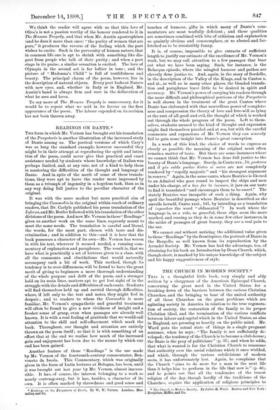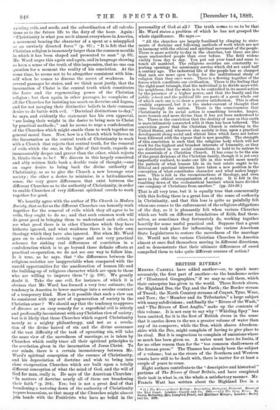THE CHURCH IN MODERN SOCIETY.* Tins is a thoughtful little
book, very simply and ably written by a clergyman of the American Episcopal Church, concerning the great need in the United States for a breaking down of the barriers between the various Christian Churches, and the bringing to bear of the united authority of all those Churches on the great problems which are agitating society in America in relation to the true regenera- tion of society, the restoration of the family to its proper Christian ideal, and the termination of the various conflicts between labour and capital which in the United States, as also in England, are pressing so heavily on the public mind. Mr. Ward puts the actual state of things in a single pregnant sentence, when he says : " The family is not sufficiently de- veloped; the tendency of the Church is to become a club-house; the State is the prey of politicians" (p. 31), and when he adds, that what is wanted is for the Christian Church to reassume that authority over the social relations which it once wielded, and which, through the various subdivisions of modern sects, it has unfortunately lost. Again, he complains that the Church " aims to do more for a man in the next life than it helps him to perform in the life that now is" (p. 46), and he points out that all the tendencies of the truest religion of the day, though hardly of the traditions of the Churches, require the application of religious principles to
• The Church in Modern Society, By Julia, 8. Ward. Boston and New York : Houghton, Mifflin, and Co.
existing evils and needs, and the subordination of all calcula. tions as to the future life to the duty of the hour. Again: " Christianity is what you see it almost everywhere in America, a movement bearing the character of a spent or a misapplied or an unwisely directed force " (p. 81) ; " It is felt that the Christian religion is immensely larger than the common moulds in which it has been shaped and presented to man" (p. 83). Mr. Ward urges this again and again, and in language showing so keen a sense of the truth of this impression, that no one can question for a moment the reality of his conviction. At the same time, he seems not to be altogether consistent with him- self when he comes to discuss the secret of weakness. In several passages he states, and we think most justly, that the incarnation of Christ is the central truth which constitutes the force and the regenerating power of the Christian religion ; but then again, in other passages, he complains of all the Churches for insisting too munch on doctrine and dogma, and for not merging their distinctive beliefs in their common desire to do battle with evil. " Doctrinal distinctions to-day," he says, and evidently the statement has his own approval, " are losing their weight in the desire to bring men to Christ by practical methods ;" and he seems to urge a confederation of the Churches which might enable them to work together on general moral lines. Now, bow is a Church which believes in the Incarnation as the central truth of Christianity to work with a Church that rejects that central truth, for the removal of evils which the one, in the light of that truth, regards as immeasurably deeper and graver than the other, which rejects it, thinks them to be ? We discern in this largely conceived and ably written little book a double train of thought,—one an eager desire to bring back the divine authority of Christianity, so as to give the Church a new leverage over society ; the other a desire to minimise, in a latitudinarian sense, the very grave differences that exist between the different Churches as to the authority of Christianity, in order to enable Churches of very different spiritual creeds to work together for good.
We heartily agree with the author of The Church in Modern Society, that so far as the different Churches can honestly work together for the removal of evils which they all agree to be evils, they ought to do so; and that such common work will do great good in bringing them to understand each other, to
see what good there is in other Churches which they have hitherto ignored, and what weakness there is in their own theology which they have also ignored. But when Mr. Ward goes on to advocate certain vague and not very practical schemes for sinking real differences of conviction in a confederation which is to go beyond these definite efforts at practical co-operation, we do not see our way to follow him. Is it true, as he says, that " the differences between the religious societies are inappreciable when compared with the untold opportunities for the amelioration of human life and the building-up of religious character which are open to those who are willing to improve them "? (p. 199). We greatly doubt it. Take the one evil, for instance, of which it is obvious that Mr. Ward has formed a very true estimate, the tendency in America to lower marriage into a secular contract of a temporary kind. How is it possible that such a view can be consistent with any sort of regeneration of society in the Christian sense ? We should say that the tendency to approve of divorce as an easy remedy for a superficial evil is utterly and profoundly inconsistent with any Christian view of society; but is it likely that those Churches which regard Christianity merely as a mighty philanthropy, and not as a revela- tion of the divine hatred of sin and the divine assurance of the vast difficulty of the task of uprooting sin, will take the same view of the sacredness of marriage, as is taken by Churches which really trace all their spiritual principles to the revelation given in the incarnation of Jesus Christ. To our minds, there is a certain inconsistency between Mr. Ward's spiritual conception of the essence of Christianity, and his depreciation of doctrine and wish to bring into close co-operation Churches which are built upon a totally different conception of what the mind of God, and the will of God for man, really is. Ile says of the American Churches : " In matters of doctrine nearly all of them are broadening their faith" (p. 204). Yes; but is not a great deal of that broadening a watering down of the authority of Christianity to pure humanism, so that many of the Churches might almost join hands with the Positivists who have no belief in the
personality of God at all ? The truth seems to us to be that Mr. Ward states a problem of which he has not grasped the whole significance. He says :—
" All the churches are largely fossilised by clinging to state- ments of doctrine and following methods of work which are not in harmony with the ethical and spiritual movement of the people. There is more activity to-day in the churches, but there are also more unchurched people than ever before. The field widens visibly from day to day. You put out your hand and seem to touch all mankind. The religious societies are constantly re- porting openings for missionary service which did not exist half a century ago. The industrial life of the people has so changed that men are more open to-day for the institutional study of religion than they once were. There is a flowing together of the forces which constitute our civilisation. - There is the feeling that the right must triumph, that the individual is to divide more with his neighbour, that the state is to be controlled in its moral action by the presence of a higher power, and that the family and the public school and the political life are parts of a great whole out of which each one is to draw a greater satisfaction. This is often crudely expressed, but it is the under-current of thought that runs through the nation. There is the consciousness that Christianity in its social action is something broader, larger, more human and more divine than it has yet been understood to be. There is the conviction that the destiny of man on this earth is more intimately connected with it than has been believed. The conviction grows that the Christian Church is entering in the United States, and wherever else society is free, upon a practical development along social and ethical lines which have not before been followed with the vigour that is now possible. The strength of this conviction is such that the religious body which will not work for the highest and broadest interests of humanity, as they are distributed in our social connections, is held to be untrue to the essentials of a Christian Church. It has come to be the aim of the great divisions of the Christian family, though it is yet very imperfectly realised, to make our life in this world more nearly the pattern of what human life in its best estate ought to be. Ethical and spiritual interests have taken a new position in the conception of what constitutes character and what makes happi- ness. This is felt in the reconstructions of theology, and even more in the ethical reorganisation of society. It is felt in the tumbling down of the ecclesiastical barriers which have divided one company of Christians from another." (pp. 224-26.) That is all very true, but it is equally true that concurrently
with this feeling there is a great loss of the sense of authority in Christianity, and that this loss is quite as painfully felt when one comes to the enforcement of the religious obligations of the day, as it is pleasantly felt when various Churches which are built on different foundations of faith, find them- selves, as sometimes they fortunately do, working together heartily for some useful practical end. Suppose that a great movement took place for influencing the various American State Legislatures to restore the sacredness of the marriage tie. Would not the various Christian Churches in America almost at once find themselves moving in different directions, and so demonstrate that their ultimate differences of creed compelled them to take quite different courses of action ?











































 Previous page
Previous page